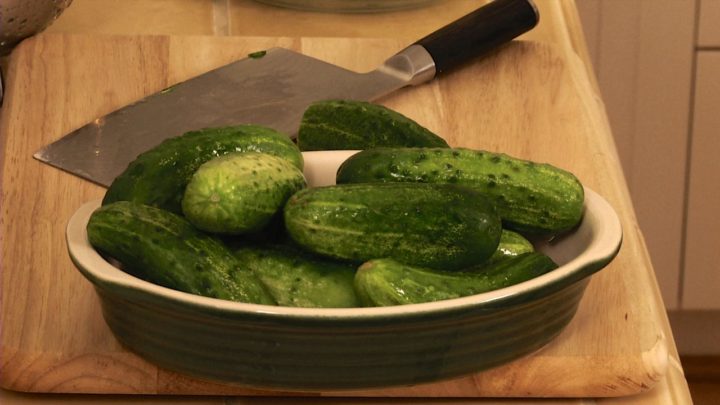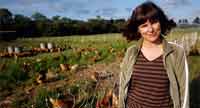
Fermenting foods has long been an important technique for extending the life of foods well beyond their harvest season. Otherwise, as humans, we would have very little to eat in the winter and probably suffer from unpleasant nutritional deficiencies like scurvy. Luckily for us, we discovered a wide range of foods that can be preserved through fermentation from drinkable food like beer, mead, and wine to fermented dairy like yogurt and cheese to fermented veggies like kimchi or pickles. Fermentation uses the action of yeasts, bacteria, and other microorganisms to partially decompose and change the chemical structure of a food. This actually allows the food to be shelf stable for a much longer period of time and provides us food during times of hardship, travels, or cold weather.
Pickling of vegetables (and even fruits) happens via two basic ways: preserved with an acid like vinegar, or those preserved with salt (either dry salted like sauerkraut or brined). Technically, vinegar pickles are not fermented because the acidity kills the bacteria that release lactic acid. Sometimes vinegar pickles are referred to as “fresh pickles”. A true fermented pickle is also described as “lacto-fermented” because of the presence of lactic acid releasing bacteria. Many studies have shown those lacto bacteria to be important for gut health and numerous other health benefits.
Depending upon where you shop for food, many, if not most, of the different brands and varieties of pickles sold will also contain high fructose corn syrup and yellow dye #5 (potentially carcinogenic) that you may wish to avoid eating. Sadly, you are unlikely to find a pickle that has been “picked and pickled” on the same day and one in which all the cucumbers were local and seasonal along with all natural ingredients. The flavor and crunch is superb and the benefits to the local economy are even more so.
Betsy Wharton, a nurse, mom, small-town politician, avid gardener, and now micro-entrepreneur has built her new pickle business upon similar values: that all ingredients be fresh, local, and procured only within their harvest season. Her nascent Clallam Canning Company in Port Angeles, WA is churning out 1,500 jars of cucumber pickles each late summer, usually selling out well before the following season. Betsy’s cucumbers come exclusively from local farmers, pickled on the same day that they are harvested, and are as fresh as they get. When she is sold out, she patiently waits until the next summer when her grower, Sunny Farms, harvests their pickling cukes once again. For two furious harvest months she picks up the cucumbers straight from the fields, sorts them to her liking, and hauls them to a commercial kitchen she rents from sun-up till sun-down on pickle days (usually 2-3 days per week that she fits around her other part-time job).
While serving in the Port Angeles city council, Betsy became interested in the economic development challenges and opportunities of her Olympic Peninsula county. Farming and canneries were once mainstays, but their presence was dwindling, as was their economic viability. Betsy wanted to be a positive part of the food web but not as a farmer. Her goal was to become an important customer for her local farms. In three short years she has bought nearly a thousand pounds of cucumbers from Sunny Farms and she grows most of the dill and garlic she uses in her recipes. Just the onions come from further away- usually Eastern Washington or Oregon where it’s hotter and dryer. In a small way she is supporting those farmers too.
Betsy’s pickles are made almost entirely by hand, with exception of the fancy used Hobart slicer she just got. Here’s a great video shot by her 12-year-old daughter that shows you the process. As you can see it’s very labor intensive- this is no industrial process but rather a handmade labor of love. Betsy has been making pickles for years for family and friends and with their encouragement now sells them at her local farmers markets and a couple small retailers. At $8-9 a pint, they might be more of a gift item rather than a pantry staple, according to Betsy herself. But her ingredients are local ($ to local farmer), she pays a friend or high school student to help her on pickling days ($ for work), her labels pretty and printed locally ($ for local printer), and she rents a catering kitchen in town ($ to building owner). She sells all the jars right on the Peninsula, and thus keeps that bit of money circulating in her region. It’s not an insignificant piece of the local food chain and she hopes to do even more. Currently she is teaming up with a larger organic vegetable producer to develop some value-added pickle products for him and she has just got approved from Washington state to make new savory jams that she plans to test out in the market with a small batch.
Will Betsy ever be able to quit her day job? She’s not sure yet. It would be hard to scale-up and make enough pickles in the short harvest time window. To achieve that would require significant investments in equipment and developing her own certified kitchen, which would then sit idle for much of the rest of the year when local produce isn’t available. But she doesn’t seem to mind sticking to the high quality and small scale that her business is at right now. She sees her role as an important piece of revitalizing the local food web. Betsy remarked, “preserving food is important- it allows us to eat local more year-round and preserves our local harvest”.
Cucumber pickles reserve a classic place in the American diet, usually sliced on top of a hamburger or perhaps diced into a relish you smother on top of your all beef frank, yet they can by utilized in a much wider variety of dishes. Betsy encouraged me to think outside of the jar a little with regards to the humble pickle. How about pickles taking center stage on a pretty cheese plate, or minced onto baked salmon, deep-fried, or even combined with chocolate? My daughter’s favorite way to eat a pickle? Wedged inside a peanut butter sandwich. Strange but yum…
Rebecca Thistlethwaite is the author of the forthcoming book Farms with a Future: Creating and Growing a Sustainable Farm Business. She runs a farm and food business consulting firm called Sustain Consulting and is starting a small homestead in Washington with her family. Rebecca also serves on the board of the Sustainable Food Trade Association and writes her own blog Honest Meat. Her other recent pursuits include training oxen, trail running, and learning how to make fermented foods.

